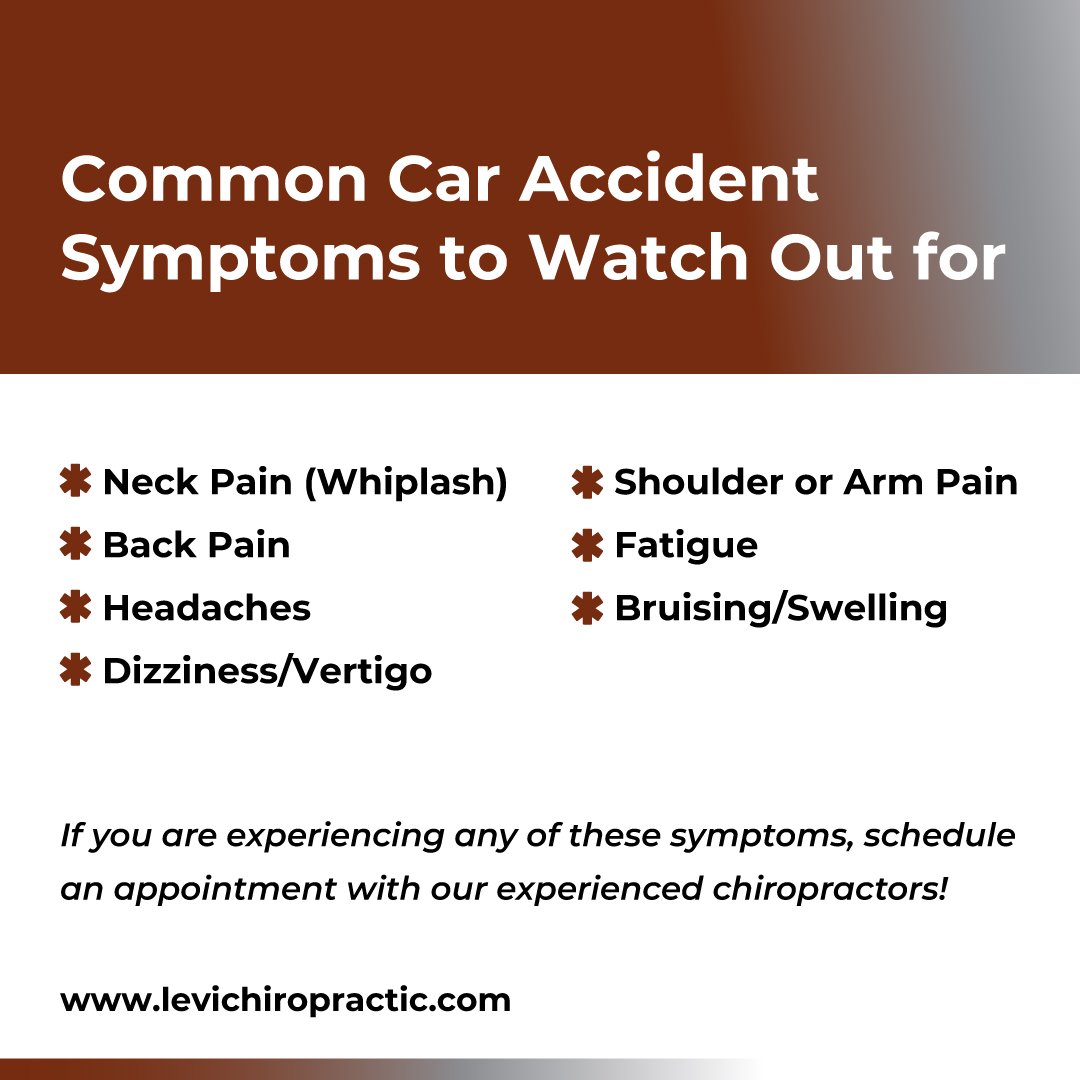It’s important to know that after an automobile accident, symptoms may not always show up immediately. In fact, some injuries from car accidents can take hours or even days to fully manifest. It’s crucial to pay attention to how your body feels following an accident, as untreated injuries can lead to chronic pain and long-term issues. Whether you were in a minor fender bender or a more serious collision, understanding the symptoms to watch for can help you seek the right treatment and start your recovery as soon as possible.
Common Car Accident Symptoms to Watch Out for

After a car accident, it’s important to stay alert to how your body feels, as some symptoms may develop over time and point to underlying injuries. Below are some of the most common symptoms of pain following an accident to pay close attention to.
Physical
It’s common to experience various physical symptoms ranging from mild discomfort to severe pain. Physical symptoms to watch for include:
Neck Pain (Whiplash)
Whiplash is one of the most common injuries from car accidents, especially rear-end collisions. This occurs when the neck is forcefully jerked forward and then backward, causing strain on the muscles and ligaments. Neck pain, stiffness, and headaches are common signs of whiplash.
Back Pain
The impact of a crash can cause misalignments in the spine leading to back pain, ranging from mild discomfort to sharp, shooting pains. The lower back is often affected, but pain can occur anywhere along the spine.
Headaches
Headaches after a crash could be a sign of a concussion or neck strain. Often caused by tension or whiplash, they can sometimes linger for days or even weeks after the accident.
Dizziness or Vertigo
Feeling dizzy or experiencing vertigo (a spinning sensation) can indicate a concussion or neck injury. It’s important not to ignore these symptoms, as they may worsen with time.
Shoulder or Arm Pain
It’s possible for pain from the neck and back to radiate to the shoulders or arms, due to nerve compression or misalignment caused by the accident. This shoulder or arm pain could lead to numbness or tingling sensations in those areas.
Fatigue
Feeling unusually tired after a crash may be a sign of physical stress on the body, as your muscles and joints are working overtime to compensate for injuries. Persistent fatigue could also be related to more serious underlying conditions like a concussion or neck injury.
Bruising or Swelling
While bruising or swelling at the site of the injury is common after any trauma, it’s important to monitor for any unusual or persistent swelling, especially if it’s accompanied by pain or difficulty moving.
Emotional
The aftermath of a car accident can also affect your mental health. It’s not uncommon for people to experience emotional symptoms following an accident, which can sometimes be just as debilitating as physical pain. Some emotional symptoms to be aware of include:
Anxiety or Stress
Feeling anxious, stressed, or on edge after a crash is quite common. You may be worried about your recovery, the insurance process, or future car accidents. Chronic anxiety can make it harder to focus on healing and moving forward.
Depression
Accident-related injuries can impact your ability to carry out everyday tasks, leading to frustration, isolation, or feelings of hopelessness. On average, 17% of people involved in car accidents experience symptoms of depression.
Sleep Issues
Pain, stress, and emotional distress can interfere with sleep, leading to insomnia or poor-quality rest. Lack of sleep can further affect your mental and physical recovery.
Car Accident Injury Treatment Options
There are several treatment options available after a motor vehicle accident to help manage and recover from injuries. Chiropractic care is one of the most effective, non-invasive approaches to treating car accident injuries. Chiropractors focus on realigning the spine, relieving soft tissue injuries, and addressing joint, muscle and nerve strain, which are all common after an accident.
Chiropractic care targets the root cause of pain instead of just masking it–promoting healing and flexibility without surgery or medication. Your chiropractor will use a variety of chiropractic techniques to help relieve pain, restore function, and support your body’s natural healing process. These techniques include:
- Spinal adjustments
- Soft tissue therapies
- Postural correction exercises
- Physical therapy to aid in rehabilitation and improve mobility
- Medication to manage pain and reduce inflammation
- Imaging tests (such as X-rays or MRIs) to accurately assess the extent of the damage and guide treatment decisions
A collaborative approach between your chiropractor and doctor can help you achieve the best possible recovery from a car accident injury.
Get Treated for Car Accident Injuries – Chiropractor in Maryland
If you’ve been in a car accident, don’t delay in getting treatment! Book an appointment with Dr. Levi today to get on the path to healing.